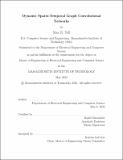| dc.contributor.advisor | Mazumder, Rahul | |
| dc.contributor.author | Tell, Max R. | |
| dc.date.accessioned | 2022-08-29T16:17:06Z | |
| dc.date.available | 2022-08-29T16:17:06Z | |
| dc.date.issued | 2022-05 | |
| dc.date.submitted | 2022-05-27T16:19:29.251Z | |
| dc.identifier.uri | https://hdl.handle.net/1721.1/144864 | |
| dc.description.abstract | Spatio-temporal modeling is an essential lens to understand many real-world phenomena from traffic [20] [10] to epidemiology [12]. Although forecasting time series is an exceptionally well-studied problem, recent years have seen impressive gains in the performance of graph learning as a paradigm for spatial learning problems. Some recent work has explored the intersection of these two fields but often assumes that the underlying graph structure is static. We introduce Dynamic Spatio-Temporal Graph Convolution Network (DST-GCN) as a novel architecture for spatio-temporal modeling with changing graph structure. DST-GCN employs a convolutional architecture to learn spatio-temporal relationships that provide strong generalization and attractive computational efficiency. We provide empirical results for several datasets from different domains that demonstrate the gains provided by DST-GCN. | |
| dc.publisher | Massachusetts Institute of Technology | |
| dc.rights | In Copyright - Educational Use Permitted | |
| dc.rights | Copyright MIT | |
| dc.rights.uri | http://rightsstatements.org/page/InC-EDU/1.0/ | |
| dc.title | Dynamic Spatio-Temporal Graph Convolutional Networks | |
| dc.type | Thesis | |
| dc.description.degree | M.Eng. | |
| dc.contributor.department | Massachusetts Institute of Technology. Department of Electrical Engineering and Computer Science | |
| mit.thesis.degree | Master | |
| thesis.degree.name | Master of Engineering in Electrical Engineering and Computer Science | |
